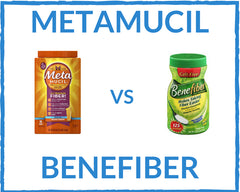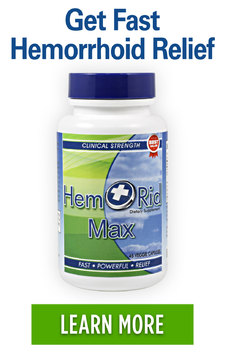Metamucil vs Benefiber: A Head-to-Head Match-Up That Reviews Metamucil and Benefiber
Posted on 01 June 2018 by Maryanne Johnson
Share this post
In this Metamucil vs Benefiber post, we'll share all the dirty little secrets about these 2 products. You'll discover if Benefiber or Metamucil is better for IBS, constipation, weight loss, hemorrhoids, and other conditions.
Are you on the hunt for the perfect fiber supplement powder and just not having any luck? It’s okay to be picky because there are hundreds of different powders out there to weigh your likes and dislikes against.
For fiber newcomers, you may not realize how so many powders could differ from one another, but with a quick glance at reviews, you will notice that products can vary in several areas like taste, effectiveness, and results.
Out of the numerous supplement powders on the market, the two reigning products are Metamucil and Benefiber. If you even execute a quick search for fiber powders, you are bound to see these two top-selling products come up in the results.
But your search persists until you know the answer to the question: which one is the better product?
Is Metamucil Rated Better than Benefiber?
Looking to the reviews is one of the crucial aspects of finding any perfect product. Customers on sites like Amazon are not shy about hiding how they feel about a product, the good and the bad. Reviews are a place of honest feedback that can guide you in deciding between two competing brands, like Metamucil and Benefiber.
For starters, Metamucil has a slew of products on sites like Amazon, Walmart, Target, and a variety of different drug stores, however, its most reputable product is fiber supplement powder, specifically in orange-smooth. This flavored fiber pulled in 339 total reviews on Amazon with an overall rank of 4.5 stars out of 5.
In slight contrast, Benefiber accumulated a total of 365 Amazon customer reviews, achieving the same overall rating as Metamucil, 4.5 stars out of 5. Unlike its competitor, Benefiber went the route of tasteless instead of adding flavoring into its powder.
With Metamucil and Benefiber neck-and-neck as far as amassed customer reviews and overall rating is concerned, how are you to know which product is better? The answer lies in the grey area of personal preference. Do you lean towards a fiber supplement with a fruity flavor? Or do you prefer it to be as if it isn’t in your beverage at all?
Ultimately, it appears as if Benefiber does pull ahead of Metamucil in the realm of customer ratings and reviews. Stopping over at Walmart’s site to view these products indicate that Benefiber has collected nearly 4,000 reviews and rated 4 out of 5 stars.
If you are looking for an excellent fiber supplement, try our very own HemRid Fiber Supplement made with Psylium Husk.
Or, if you would rather get your daily fiber intake with gummies, our HemRid Fiber Gummies would be perfect for you. Plus, they are made with Chicory Root!
On Walmart’s site, Metamucil did not accrue nearly the amount of reviews as Benefiber did. But with 355 reviews on Walmart, Metamucil Orange-Smooth still held on to its 4 out of 5-star ranking.
Reviews do hold weight when the overall consideration of the product is concerned, but it should be noted that Walmart might not be a hub for reviewers or receive as much traffic as Amazon, serving as a possible explanation to the imbalance of total reviews between these two products.
It is a tight race between Benefiber and Metamucil, but all in all, Benefiber seems to be one step ahead, even if it is ever so slight.
What Can I Use Metamucil or Benefiber For?
Fiber is an active ingredient in both Metamucil and Benefiber. As such, you're assured of numerous health benefits from any of them.
With a supplement such as Benefiber, you can improve your gut health, thereby easing stomach pain, but that's a tip of the iceberg. Both fiber-based products can help against celiac disease and hemorrhoids, but this guide will focus on IBS, cholesterol, and constipation.
Which is Better for IBS, Benefiber or Metamucil?
Irritable Bowel Syndrome (IBS) is one of the most common gastrointestinal disorders, and its milder form affects nearly 40% of people, and worldwide, IBS impacts 10-15% of the international population.
The tricky aspect of having IBS is that each individual is different. Some people may respond better to one fiber supplement or dietary change than others.
IBS is a long-term disorder involving gastrointestinal disturbances in the intestines and bowel functions, resulting in symptoms such as:
- Abdominal pain (upper or lower)
- Bloating
- Feeling gaseous
- Diarrhea
- Constipation
- Other changes in bowel habits
According to the International Foundation for Functional Gastrointestinal Disorders (IFFGD), fiber supplements derived from psyllium aid in specific IBS symptoms like diarrhea, incomplete evacuation, upper and lower abdominal pain, and constipation. Metamucil’s dietary fiber is extracted from psyllium and can help with these symptoms.
IFFGD does not list wheat dextrin in its chart as one of the fiber supplements that target IBS symptoms. Wheat dextrin is the fiber that Benefiber utilizes in its formula. In fact, other than online forums for IBS sufferers, there is not a lot of evidence to support wheat dextrin’s effectiveness in treating IBS symptoms.
A recent study has demonstrated that psyllium can have positive effects for IBS sufferers, relieving common symptoms like excessive gas and abdominal discomfort. As far as which fiber supplement is better for IBS, the research leans toward Metamucil and its psyllium component, but again, this could vary from individual to individual.
Is Metamucil or Benefiber Better for Cholesterol?
What do you need to know about cholesterol and fiber? First and foremost, there have been many studies conducted on this subject, and while effects of fiber are minimal, a daily intake of fiber can help reduce LDL (low-density lipoprotein) cholesterol. Having high levels of LDL cholesterol can increase the risk of heart disease, and you will often hear LDL cholesterol called “bad cholesterol” because of this.
The bottom line concerning the relationship between fiber and low cholesterol levels is that soluble fiber is the nutrient that actively aids in lowering LDL cholesterol.
While studies have shown that getting soluble fiber from foods like oats and beans can prove to be a helpful tool in lowering LDL cholesterol, fiber supplements can also be implemented to bridge the dietary gap.
Both Metamucil and Benefiber contain soluble fiber but from two different sources. Metamucil uses psyllium in contrast to Benefiber’s wheat dextrin. Which source is best for lowering cholesterol?
Based on a study conducted in 2017, results indicated that viscous and gel-forming fibers lowered high cholesterol levels in comparison to fiber supplements that had no viscosity and low solubility.
Regarding Metamucil and Benefiber, Metamucil did lower cholesterol because its fiber is derived from psyllium, which is both viscous and gel forming. Alternatively, Benefiber did not lower cholesterol due to wheat dextrin's lack of these properties central to reducing cholesterol levels.
Psyllium is your friend when it comes down to lowering your cholesterol levels, and if this is your ultimate goal, go for the bottle of Metamucil instead of Benefiber.
And while more and more studies are being conducted based on this complex relationship between cholesterol levels and soluble fiber, it does appear as if Metamucil and psyllium are ahead of other fiber supplements, even if this has not yet evaluated by the Food and Drug Administration (FDA).
Benefiber vs Metamucil for Constipation
Wheat dextrin, used by Benefiber, and psyllium husk, used by Metamucil, may both be soluble fiber but their differences are worlds apart. Wheat dextrin and psyllium husk have contrasting properties that produce different effects concerning constipation, diarrhea, weight management, IBS symptoms, and cholesterol levels.
A study conducted in 2015 produced results showing that psyllium taken as a fiber supplement has proven results of relieving symptoms of constipation and diarrhea, and helps normalize bowel movements for IBS sufferers.
Psyllium fiber is described as a soluble fiber with a high water-holding capacity, is also gel-forming and contains a high level of viscosity. All of these elemental properties allow for psyllium to act both as a stool softener and a laxative, both attributes that can immensely relieve constipation.
Alternatively, wheat dextrin does not have the same laxative properties and at specific doses, can even have constipating effects. This is because wheat dextrin fails to hold water and is not as viscous as psyllium soluble fiber.
Because of these results, Metamucil and its use of psyllium as apart of its supplement formula are more effective for the condition of constipation.
A Metamucil Versus Benefiber for Hemorrhoids Matchup
Fiber is one of the best dietary changes you can make to shrink hemorrhoids and help relieve common symptoms. Taking fiber supplements with plenty of water can decrease hemorrhoid inflammation.
Soluble fiber can soften stools and make bowel movements less strained, and both aspects of this serve as an alleviation and prevention of hemorrhoid inflammation.
While it appears that psyllium fiber has more research to back its effects, both wheat dextrin and psyllium can equally aid in calming hemorrhoids. This means that you can either use Metamucil or Benefiber if you suffer from internal or external hemorrhoids.
Customer reviews for both products indicate that results from daily intake have aided in relieving hemorrhoids. Because both Benefiber and Metamucil are comprised of soluble fiber, you will see shrinkage in hemorrhoids with consistent and regular use of both products.
Any Substitute for Benefiber or Metamucil?
There may be different types of fiber, but they all have excellent health qualities whether in fresh or powder form.
So, suppose you show allergic reactions to the use of supplements. You may substitute Metamucil or Benefiber with fiber rich foods, such as berries, avocadoes, bananas, broccoli, sweet potatoes, and dark chocolate.
It's advisable to drink plenty water, too. Fiber absorbs water, helping to improve stool bulkiness and achieve other benefits.







0 comments